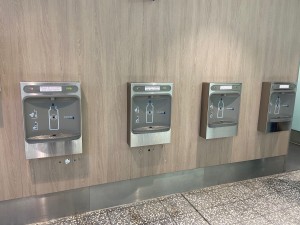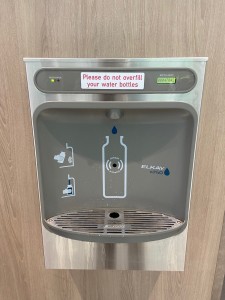More than 34,000 plastic bottles were potentially prevented from being sent to landfill in just one week after Bristol Airport almost doubled its number of free water refill stations.
The airport installed six new stations, pictured, last month as it headed into its busiest period of the year – taking to 13 the total number of refill locations in the terminal.
Airport bosses estimate around 5,000 bottles worth of water was dispensed from the new refill stations in its first seven days alone – a saving of 34,000-plus single-use plastic bottles.
Across the UK around 35.8m single-use plastic bottles are bought every day – but only around 45% are recycled.
Bristol Airport head of customer operations Richard Thomasson said the roll-out of the new water refill stations across the terminal was another step in helping customers use less single-use plastic and to enjoy free drinking water on the go.
“To see 34,000 plastic water bottles in the first week being saved from being sent to a landfill site is an incredible stat and we encourage all customers to use these new water stations,” he added.
“We’re seeing more customers carry a reusable water bottle through security and we are committed to provide an increased service for free water refills to help people save money as well as helping out the environment.”
The new water refill stations have been installed adjacent to Boots in the departure lounge and by gates 7,12 and 34 for customer and colleagues to use.
Bristol Airport expects to handle more than 1.5m passengers over the summer holiday period.
Up to 37,000 people are expected on some days over the August bank holiday weekend – the highest number since before Covid devastated air travel in 2020.
The airport, which is recovering faster from the impact of the pandemic than most others in the UK, has set itself an ambitious target of becoming net zero by 2030.
To achieve this. it has brought in – or is planning – a raft of measures aimed at making it as sustainable as possible within the constraints of the aviation industry.
It has recently started taking power from its own 2.8-acre array of ground-mounted solar panels and slashed emissions from equipment used to get passengers and baggage onto aircraft to almost zero by using electric ground vehicles instead of diesel.



















